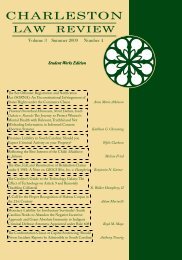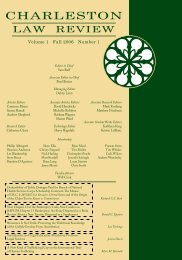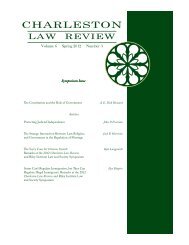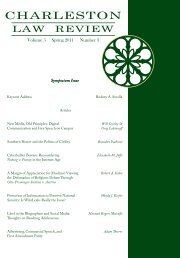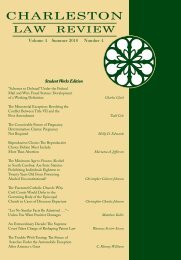Volume 5 Winter 2011 Number 2 - Charleston Law Review
Volume 5 Winter 2011 Number 2 - Charleston Law Review
Volume 5 Winter 2011 Number 2 - Charleston Law Review
You also want an ePaper? Increase the reach of your titles
YUMPU automatically turns print PDFs into web optimized ePapers that Google loves.
SCHULZE FINAL.doc1/20/<strong>2011</strong> 6:14PMCHARLESTON LAW REVIEW [<strong>Volume</strong> 5lost, therefore, to provide students both with an idea of what theydid well and what they could have done better. ASPs remedythat problem by turning summative assessment into formativeassessment, without a time-cost to doctrinal faculty, by providingboth positive and constructively critical feedback on students’work. 223At the University of Connecticut School of <strong>Law</strong> and NewEngland <strong>Law</strong> | Boston, for instance, students meet withacademic support professors for feedback on their mid-year examessays. 224 Students are required to obtain, read, and criticallyanalyze their mid-year essays before submitting the essays toacademic support faculty with whom they later meet. 225 Duringthat meeting, ASP faculty work with the student to identifystrengths and weaknesses in the student’s work. 226 Because thepurpose of such a meeting is not to reteach doctrine, 227 theaspects of critique usually focus on isolating examples of thetheir current proficiency in a subject as well as what they must do to improve.Id.223. See Bloom & Schulze, supra note 43, at 14–15.224. See id. at 13; E-mail from Rebecca Flanagan, Coordinator, AcademicSuccess Programming, Univ. of Conn. Sch. of <strong>Law</strong>, to author (June 29, 2010,15:08 EST) (on file with author) [hereinafter Flanagan E-mail].225. See Bloom & Schulze, supra note 43, at 13 (New England <strong>Law</strong> |Boston); Flanagan E-mail, supra note 224 (University of Connecticut School of<strong>Law</strong>).226. See Bloom & Schulze, supra note 43, at 13; Flanagan E-mail, supranote 224.227. See Bloom & Schulze, supra note 43, at 14–15. A debate exists in theacademic support field regarding the role of doctrine in law school academicsupport. While it is widely acknowledged that there is significant peril in “reteaching”doctrine, the wholesale schism between doctrine and skills is equallyquestionable. See id. As such, many in the field advocate for “contextualized”or “integrated” academic support, meaning that academic support attempts toimprove students’ skills by means of problems and activities in the context ofsubject matter recently learned in doctrinal courses. See id. at 16. A relatedthesis is that academic support professionals should avoid methods that focuson “tutoring” students. Id. at 14–15. There are two reasons for this. First,tutoring may implicitly place the responsibility for learning in the hands of thetutor, rather than the student. Id. This is especially detrimental for the studyof law, since a substantial part of legal education is teaching students how toteach themselves the law. Id. Second, tutoring by an instructor other than thestudent’s professor could fail to account for crucial doctrinal nuancesconstituting an important part of the professor’s grading. See id. at 16.Further scholarship on these issues is warranted.322



